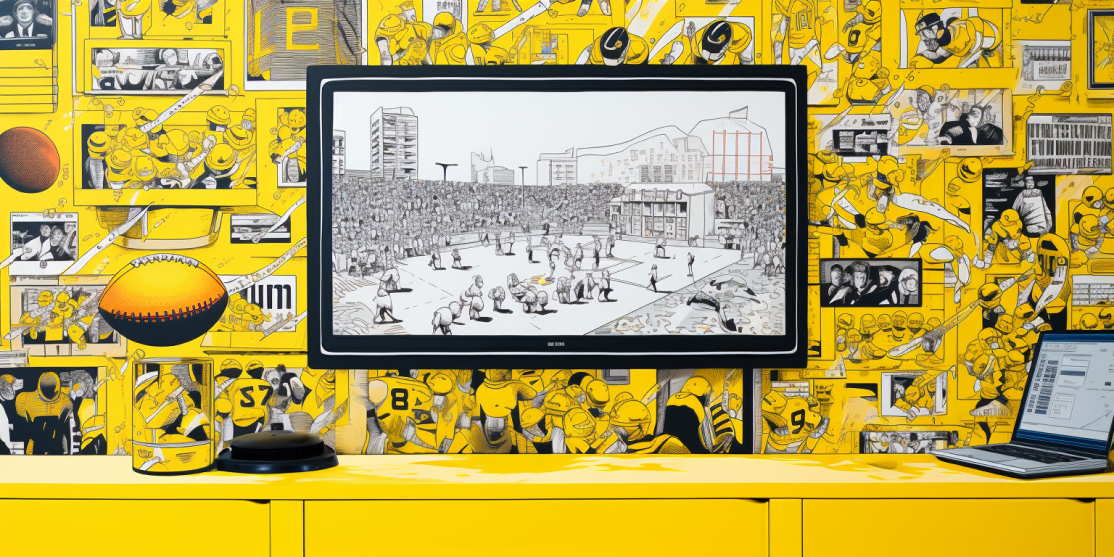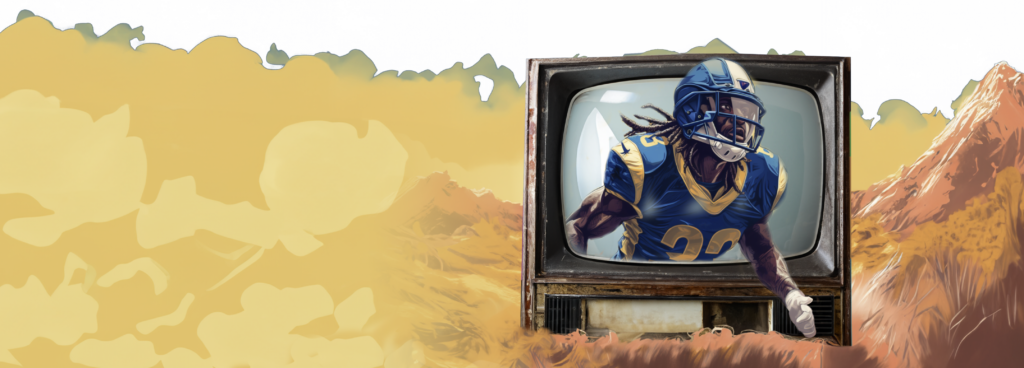The
future of
sports rights
in streaming
is drama
There is an uneasy tension in the sports rights model across cable, broadcast, and streaming.

On the one hand, cord-cutting is eating away at the extraordinary scale of linear, which counted more than 105 million cable TV households in the US over a decade ago. The pricing of past sports rights deals reflected that, and not so much the promise of streaming.
Today, there are around 60 million homes with cable access, and over 75 million if we include virtual cable distributors like YouTube TV and Fubo TV.
On the other hand, new sports rights deals must assume both the declining scale of cable network distribution and the growth of streaming. The recent NFL deal has Paramount’s CBS, Comcast’s NBC, and Disney’s ABC and ESPN all distributing games across both linear and streaming platforms (Fox will distribute via linear, only). Deals struck in the past few years by the NHL, the PGA Tour, and WWE also have versions of the linear plus streaming business logic built in.
There are growing questions emerging about the business model of streaming. Legacy media streaming services are struggling to scale and to turn a profit. The worry is that some may not be around in a few years. In some cases, like with Paramount Global, their negative free cash flow and junk-rated debt are legitimate reasons for partners like the NFL to be worried.
Four scenarios
The uneasy tension creates four possible scenarios:
1.
Cord-cutting accelerates and legacy media streaming services do not scale.
2.
Cord-cutting accelerates and legacy media streaming services continue to scale.
3.
Cord-cutting slows down and legacy media streaming services do not scale.
4.
Cord-cutting slows down and legacy media streaming services continue to scale.
Until January 2022, the market assumed either scenario #2 or scenario #4: Everyone expected streaming to be the inevitable heir to linear distribution. When Netflix missed its growth forecast for Q4 2021, everything changed. The miss triggered a 65% drop in Netflix’s stock price and drops in the price of the legacy media companies. Wall Street reacted with new demands for profitability over growth.
The market now seems to believe scenarios #1 and #3 are more likely as potential futures for legacy media. Legacy media companies are being priced accordingly, witnessing their stock prices decline as they struggle to deliver growth while cutting costs to ensure profitability. Sports TV broadcasts may thus never again see the scale of the past few decades. This year’s MLB World Series was reportedly the least-watched on record, averaging 9.11 million viewers. That is around 20% of the most-watched World Series of 1978, which had an average viewership of 44.28 million viewers.
Enter Amazon and YouTube
The NFL’s deals with Amazon and Google’s YouTube have introduced some new paradigms for how scale may be aggregated. In the US, Amazon has an estimated 168 million Prime subscribers and YouTube reaches 150 million people across connected TVs. To distribute Thursday Night Football, Amazon is paying the NFL about $1 billion per year through 2033, Fox, Paramount, and Comcast are paying $2 billion per year, and Disney is paying around $2.7 billion. YouTube is betting on broadcast economics for its Sunday Ticket distribution deal with the NFL—$14 billion over seven years, a 33% increase from DirecTV’s $1.5 billion deal.
Owning the fiber-optic points of connection with consumers means that cable companies market on behalf of third parties to drive tune-in. YouTube and Amazon meanwhile rely on consumers randomly visiting and revisiting their platforms for free consumption of content or shopping. All TV homes can instantly tune in with the tap of a remote control, but not all YouTube or Amazon users have those platforms readily accessible from their connected TVs, mobile devices, tablets, or desktop computers. There is more friction in the paths on YouTube and Amazon between the decision to tune in and actually tuning into the game.
That said, the 2023 NFL season has been a success so far on both platforms. YouTube has now taken over Sunday Ticket and surpassed DirecTV’s total annual subscribers (hitting an estimated 1.3 million subscribers, up from 1.2 million). Amazon’s Thursday Night Football is averaging 12.2 million viewers this season, up 26% from the 9.7 million for the first nine games in 2022. Including Amazon’s internal data with Nielsen data, Thursday Night Football is averaging 13.22 million viewers for the season, to date.
YouTube and Amazon rely on consumers randomly visiting and revisiting their platforms for free consumption of content or shopping. All TV homes can instantly tune in with the tap of a remote control, but not all YouTube or Amazon users have those platforms readily accessible”
Legacy media streaming services are struggling to scale and turn a profit. The worry is that some may not be around in a few years.”
Mark Cuban and aggregate audiences
One of the more notable aspects of Amazon’s Thursday Night Football product is that it offers Amazon Prime subscribers multiple broadcasts: the Spanish feed (TNF en Español) and the advanced stats feed (Prime Vision with Next Gen Stats), to which the company has been adding AI innovations. Amazon has also offered feeds from YouTube influencers Dude Perfect, and NBA star LeBron James and his business partner Maverick Carter. On top of those, Amazon distributes a linear feed via DirecTV to over 300,000 sports bars, restaurants, hotel lounges, casinos and sports books, retail shops and services, and other venues nationwide.
The approach mirrors a personal favorite quote from NBA team Dallas Mavericks owner Mark Cuban in an interview he gave to SportTechie in April 2020. It is worth re-reading whenever a new sports distribution rights deal is announced:
“Can we have three, four, five streams of the same game that’s going on traditional TV? You might have one where you have Twitch-like announcers; you might have two of your favorite YouTubers that are doing another stream; you might have your traditional broadcasters doing another stream; you might have a players-only doing another stream. We don’t care if there’s four, five, six streams—we care about the aggregate audience.”
There are two key takeaways from this quote. First, audiences have affinities or preferences for viewing experiences that the internet enables. Therefore, the best distribution strategy in sports is aggregating audiences across platforms. Rights deals need to enable that. Second, we are still in the early experimental days. The future of sports distribution probably involves linear distribution at a smaller scale and some evolution of the aggregation of multiple streams that capture smaller audiences around their affinities and fandoms.

As for Netflix
The other player to keep an eye on is Netflix. Co-CEO Ted Sarandos told investors on the company’s most recent earnings call: “We are in the sports business, but we’re in the part of the sports business that we bring the most value to, which is the drama of sport.” By “drama” he was referring to the docuseries about Formula 1 Racing (“Drive to Survive”), the PGA Tour (“Full Swing”), and the Tour de France (“Unchained”).
But, in the same answer, he also mentioned that Netflix is “investing heavily in increasing our live capabilities so that as the demand grows for that and we find different ways, the liveness can be part of the creative storytelling, we want to be able to do that at a big scale.”
An example he cited was The Netflix Cup, which streamed live on November 14 to mixed reviews. It was a live golf tournament with the casts of Drive to Survive and Full Swing.
Sarandos’ explanation ties back to something he said back in December 2022 at the UBS 50th Annual Global TMT Conference: “the economics of live sports are built around pay TV and don’t make sense for streaming.” So, Netflix management did not see a “profit path to renting big sports”, then, because the return on investment is lower. That is likely because their model relies more heavily on subscribers, and traditional sports broadcasts have relied more heavily on advertising in network TV, as well as both affiliate fees and advertising in cable broadcasts.
The question one year later is how Netflix’s management may see the opportunity differently. If The Netflix Cup is a precedent, live streaming content needs to be related to documentary content hosted and owned by Netflix. There needs to be an interplay between the two to justify the ROI.
On this point, John Ourand of Sports Business Journal reports that Netflix is considering creating a docuseries around the NBA’s new In-Season tournament. The business model will be a step in the direction of the cable TV business, monetizing viewers with both subscription revenue and advertising revenue. But, as Sarandos told the UBS Conference, the value of the rights to Netflix will be different from broadcast because the economics of the streaming model requires it.
If The Netflix Cup is a precedent, live streaming content needs to be related to documentary content hosted and owned by Netflix.”
The NBA deal
The next NBA deal will start in the 2025 season and the league is already shopping it around. Under the NBA’s current agreement, Disney’s ESPN/ABC and Warner Bros Discovery’s TNT collectively pay $2.6 billion each year to televise about 165 nationally distributed games. One expectation is that the deal price will go up, but another expectation is that Disney and Warner Bros. Discovery will not be in a strong enough position to deliver the same audiences or ROI they were once able to.
The looming question is: why won’t Netflix imitate YouTube and Amazon’s bet on broadcast economics in any deal with the NBA in 2024?”
If the Netflix signals are right, beginning in 2024 the next NBA deal is going to be an aggregation of different distribution models. First, Disney and Warner Bros. Discovery will remain, but at a smaller scale than their current 165 games. Second, Apple, Amazon, and YouTube all seem well-positioned to capture some of those games, and perhaps more, given Disney’s and Warner Bros. Discovery’s recent challenges in the linear advertising marketplace. Last, Netflix will be distributing 67 games of the in-season tournament.
Whether it will be ideal for the NBA and its partners is anybody’s guess. Even the NFL is looking nervously at the future of its legacy media distribution deals, with Paramount’s status facing the most questions. Aggregation is ultimately a portfolio approach to distribution and not a one-size-fits-all solution. So, whether rights deals are undervalued or overvalued will ultimately depend on how a sports league manages its portfolio of deals, and how its partners manage their various cohorts of audiences.
Do you agree with this?
Do you disagree or have a completely different perspective?
We’d love to know
Can insurgent leagues capture market share from the NFL?
This topic kept coming up in our various events: the NFL is God. And God is immune to all the forces that are challenging the other incumbent leagues like the NBA and MLB. What makes the NFL so powerful? Is it a better TV experience? Is it a better sport? The rest of the world would argue against that. (And they probably want the word football back).
The NFL is built on initial scarcity. It started with two games broadcasted one day a week in the autumn. Then came Sunday Night Football, then Monday Night Football. Then Thursday Night Football followed that. Now we have Sunday Ticket and the Red Zone channel. All of that football turned into fantasy football leagues, online gambling. And all of that engagement is padded with endless expert analysis that fills in the gaps in between all the snaps. Is this ecosystem too strong to be disrupted?
This question unlocked a lot of thinking.
What does a league need to thrive? How can an old sport evolve and find new audiences? Can a team of insurgent leagues take down the mighty NFL?






